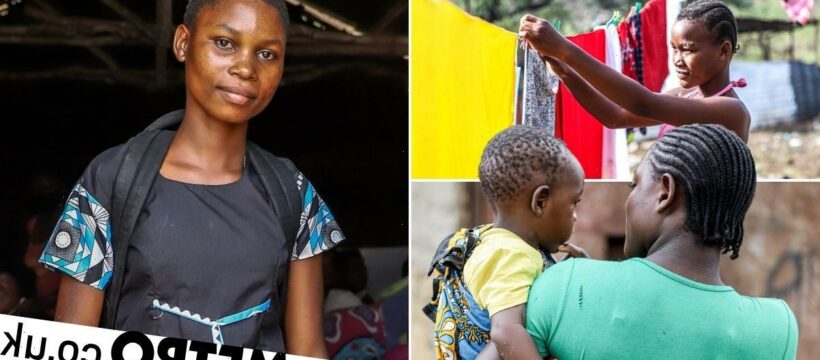Education is still a hard-fought battle in many parts of the world, especially for young girls.
The pandemic has worsened these issues due to lockdowns and tight restrictions.
In Uganda, schools were closed for a total of 83 weeks and only recently reopened – and, aside from gender, there are other factors at work that stop young girls from getting an education.
ActionAid says child marriage, period poverty, pregnancy, and violence are all common reasons why a disproportionate number of girls are missing out on their school days.
It’s estimated that 129 million girls worldwide are out of school. In Kenya alone, that figure is more than 600,000.
On top of this, the Malala Fund believes the pandemic will push another 20 million girls out of school by the end of it.
In Kenya, ActionAid has been working to provide catch-up classes on literacy and numeracy to girls aged between 10 and 19 – as part of their ‘education for life’ programme.
As well as these basic skills, they learn about their human rights over a nine-month period.
The organisation also works to ensure the partners and family of the girls support their choice to attend – as this too can often be a blocker to joining a class.
Many of these girls dropped out of school, or never got the chance to go to in the first place.
Now, they’re fighting to get the opportunity to study.
‘I left school when I got pregnant,’ 17-year-old Nadia tells Metro.co.uk.
‘I’m worried about going to school now, because I don’t know how to write and I’m worried if I am asked questions, I won’t know how to answer.
‘I got pregnant and went to my husband’s place, but I am not at peace there.’
Everyday, Nadia’s time is taken up by household chores, such as washing and cleaning. Her siblings go to school, and she cooks their meals when they get back – which seems a cruel disparity.
She continues: ‘Life is hard here. For example, today you may get money and you will have food, but tomorrow if you don’t get any money you will have nothing to eat.
‘I would love to start a business selling clothes and shoes.’
Often when girls are unable to go to school, they are made to work in unsafe conditions.
In Mwakirunge, Kenya, many girls live and work on a dumpsite, collecting plastic bottles to sell.
It’s hazardous and education can provide them with a route out.
ActionAid has been working with local partners Sauti ya Wanawake women’s movement and Usafi ni Uhai (cleanliness is life) to support girls in these circumstances – Nadia being one of them.
She sells food near the dumpsite and, while she’s been encouraged to go to a formal school, being illiterate has made that impossible as she feels she can’t ‘fend for herself’.
‘At the girls forum we receive training on our rights, including on sexual and reproductive health and protection against violence. We also learn where to report violence,’ Nadia adds.
The classes have allowed her to gain back some of what she’s missed at school, though clearly this problem can’t fall on charities to fix alone.
For Zeinabu, who is 13 years old and one of 11 children (a few of which have sadly passed away), it’s an issue of money.
She would like to go to school but her parents, who are farmers, can’t afford the fees.
She tells us: ‘When I get up each morning, I go and fetch water from the well. When I finish, I go home, I cook, eat, then I bath and get dressed and go to the catch-up centre [for ActionAid’s classes].
‘My teacher teaches us nicely. We study, we work, she marks it, and we take books home and keep them in the bag. I’m studying Maths, English and Kishwali.
‘I like Maths. Since I came here, I can count, I can add, I can subtract and divide. I can also write my name now.’
Zeinabu sees people go to the mainstream school and wishes that she could join too, which is the plan once she’s caught up more.
She adds: ‘My parents could not afford my school fees, so I was staying at home, and I was told there is a local free project available – I told my mum and she said “great let me take you with Karembo [my sister] as well”.’
She hopes to one day be a tailor.
Going to school isn’t so simple when there are other forces at play that dictate the lives of these children.
Anisa, 10, works on a huge dumpsite in Mombasa County and many of her acquaintances aren’t getting any kind of education at all – not even through the catch-up programme.
‘I stay here in the dumpsite,’ she says. ‘We live here and we look for plastics to sell. The money then goes to helping me go to school.
‘My friends who live on the dumpsite, I just see them playing, washing utensils, they don’t go to school from there they go to look for things in the dump site. I feel bad, I wish they could be going to school and getting educated.’
Anisa has now started going to a school after Liz, an ActionAid worker, helped with her fees. Anisa adds that, when she grows up, she wants to be Liz’s bodyguard.
However, going to school comes with some snobbery from other students though, who ‘laugh’ at her for still living in the dumpsite.
She adds: ‘I love studying hygiene with my friends. When I grow up, I want to be a police officer.’
Thanks to the work of the organisation, alongside her determination to learn while working, one day she might just be.
You can support ActionAid’s appeal to Let Her Learn.
Do you have a story to share?
Get in touch by emailing [email protected].
Source: Read Full Article


